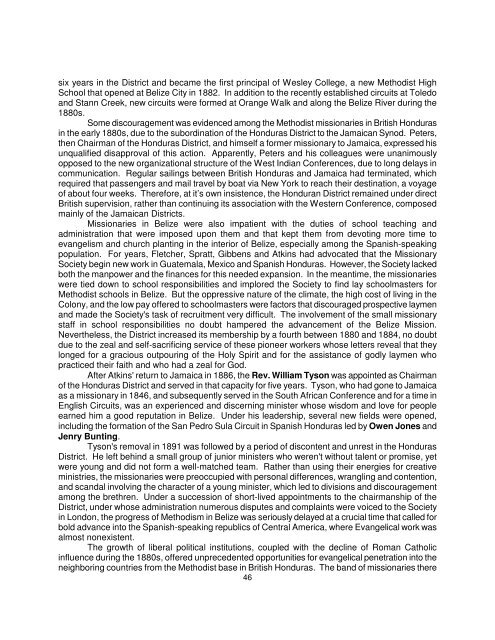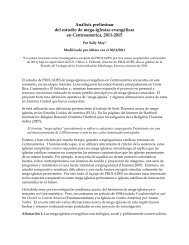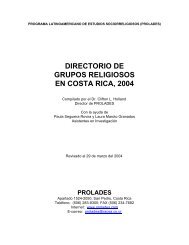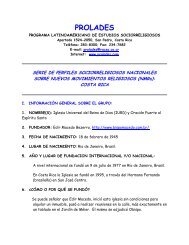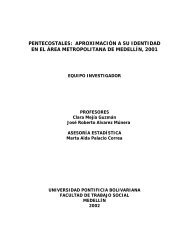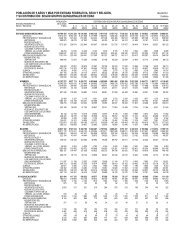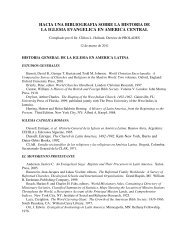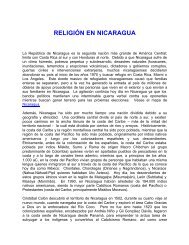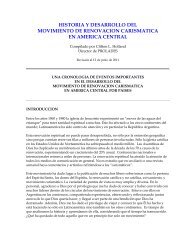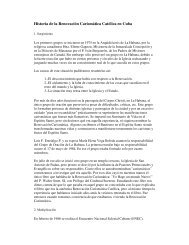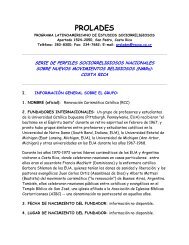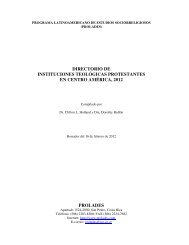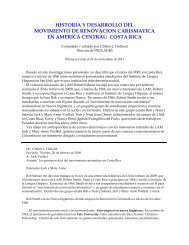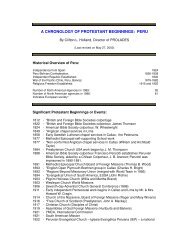belize, 1980 - Prolades.com
belize, 1980 - Prolades.com
belize, 1980 - Prolades.com
You also want an ePaper? Increase the reach of your titles
YUMPU automatically turns print PDFs into web optimized ePapers that Google loves.
six years in the District and became the first principal of Wesley College, a new Methodist High<br />
School that opened at Belize City in 1882. In addition to the recently established circuits at Toledo<br />
and Stann Creek, new circuits were formed at Orange Walk and along the Belize River during the<br />
1880s.<br />
Some discouragement was evidenced among the Methodist missionaries in British Honduras<br />
in the early 1880s, due to the subordination of the Honduras District to the Jamaican Synod. Peters,<br />
then Chairman of the Honduras District, and himself a former missionary to Jamaica, expressed his<br />
unqualified disapproval of this action. Apparently, Peters and his colleagues were unanimously<br />
opposed to the new organizational structure of the West Indian Conferences, due to long delays in<br />
<strong>com</strong>munication. Regular sailings between British Honduras and Jamaica had terminated, which<br />
required that passengers and mail travel by boat via New York to reach their destination, a voyage<br />
of about four weeks. Therefore, at it’s own insistence, the Honduran District remained under direct<br />
British supervision, rather than continuing its association with the Western Conference, <strong>com</strong>posed<br />
mainly of the Jamaican Districts.<br />
Missionaries in Belize were also impatient with the duties of school teaching and<br />
administration that were imposed upon them and that kept them from devoting more time to<br />
evangelism and church planting in the interior of Belize, especially among the Spanish-speaking<br />
population. For years, Fletcher, Spratt, Gibbens and Atkins had advocated that the Missionary<br />
Society begin new work in Guatemala, Mexico and Spanish Honduras. However, the Society lacked<br />
both the manpower and the finances for this needed expansion. In the meantime, the missionaries<br />
were tied down to school responsibilities and implored the Society to find lay schoolmasters for<br />
Methodist schools in Belize. But the oppressive nature of the climate, the high cost of living in the<br />
Colony, and the low pay offered to schoolmasters were factors that discouraged prospective laymen<br />
and made the Society's task of recruitment very difficult. The involvement of the small missionary<br />
staff in school responsibilities no doubt hampered the advancement of the Belize Mission.<br />
Nevertheless, the District increased its membership by a fourth between 1880 and 1884, no doubt<br />
due to the zeal and self-sacrificing service of these pioneer workers whose letters reveal that they<br />
longed for a gracious outpouring of the Holy Spirit and for the assistance of godly laymen who<br />
practiced their faith and who had a zeal for God.<br />
After Atkins' return to Jamaica in 1886, the Rev. William Tyson was appointed as Chairman<br />
of the Honduras District and served in that capacity for five years. Tyson, who had gone to Jamaica<br />
as a missionary in 1846, and subsequently served in the South African Conference and for a time in<br />
English Circuits, was an experienced and discerning minister whose wisdom and love for people<br />
earned him a good reputation in Belize. Under his leadership, several new fields were opened,<br />
including the formation of the San Pedro Sula Circuit in Spanish Honduras led by Owen Jones and<br />
Jenry Bunting.<br />
Tyson's removal in 1891 was followed by a period of discontent and unrest in the Honduras<br />
District. He left behind a small group of junior ministers who weren't without talent or promise, yet<br />
were young and did not form a well-matched team. Rather than using their energies for creative<br />
ministries, the missionaries were preoccupied with personal differences, wrangling and contention,<br />
and scandal involving the character of a young minister, which led to divisions and discouragement<br />
among the brethren. Under a succession of short-lived appointments to the chairmanship of the<br />
District, under whose administration numerous disputes and <strong>com</strong>plaints were voiced to the Society<br />
in London, the progress of Methodism in Belize was seriously delayed at a crucial time that called for<br />
bold advance into the Spanish-speaking republics of Central America, where Evangelical work was<br />
almost nonexistent.<br />
The growth of liberal political institutions, coupled with the decline of Roman Catholic<br />
influence during the 1880s, offered unprecedented opportunities for evangelical penetration into the<br />
neighboring countries from the Methodist base in British Honduras. The band of missionaries there<br />
46


